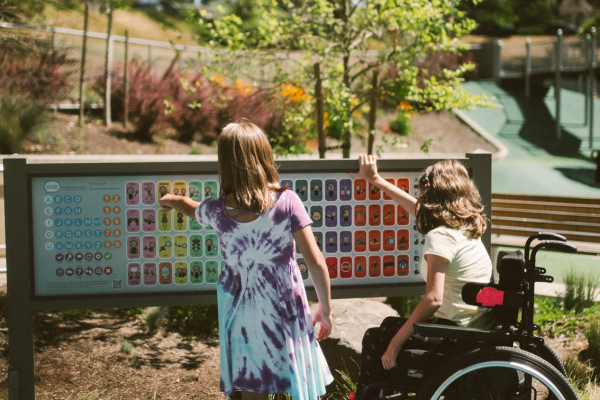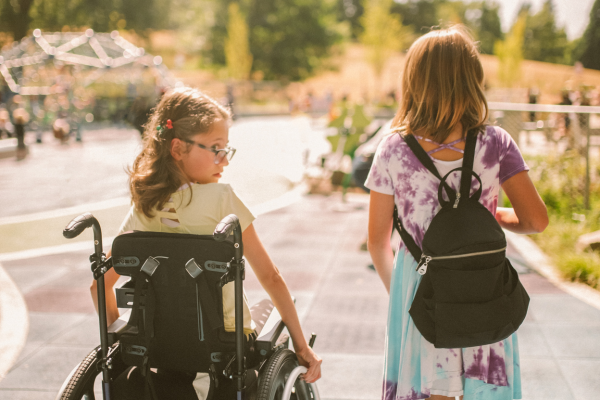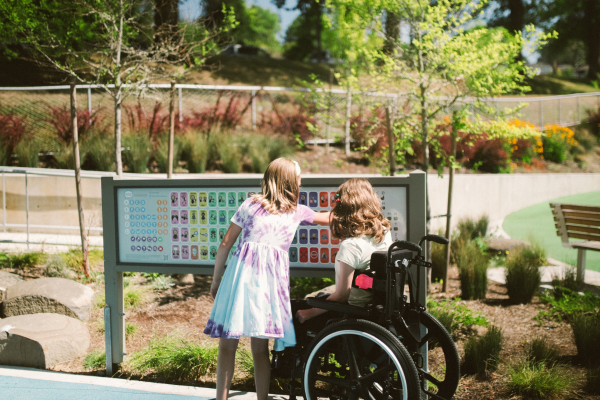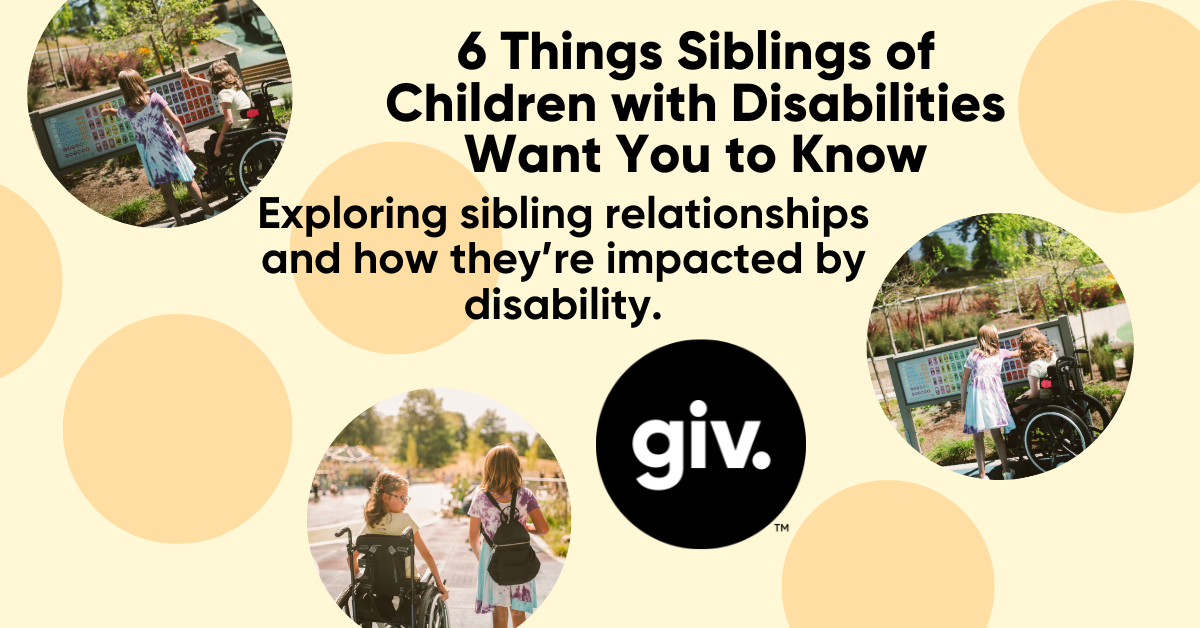Siblings of children with disabilities play a unique and significant role in their family dynamics. From an early age, they find themselves navigating a world that may require more understanding, empathy, and responsibilities. In this blog post, we will delve into the experiences and perspectives of siblings of children with disabilities, shedding light on the challenges they face, the love they share, and the importance of inclusion. These remarkable individuals play a vital role in supporting their disabled siblings and deserve recognition and understanding.
Siblings of Children with Disabilities
Siblings of children with disabilities often find themselves caught between two worlds – the typical world of other children and the unique world of having a disabled sibling. Research suggests that most siblings of children with disabilities have a strong bond with their disabled family member, which often begins at a young age and endures throughout their lives.
As they grow older, they may face the challenges associated with their sibling’s disability, including behavioral problems, learning disabilities, or mental illnesses. Despite these challenges, their bond with their special needs sibling can foster a sense of resilience, compassion, and understanding towards others with disabilities.
Understanding the World of Siblings of Children with Disabilities
Growing up with a disabled sibling means experiencing a different family life compared to other kids. Siblings of children with disabilities often witness their parents’ tireless efforts to meet their sibling’s needs, which can sometimes result in less attention being given to their own needs.
This unique familial situation can shape their perspectives, teaching them the values of compassion, empathy, and problem-solving from a young age. However, it is crucial for parents to provide support and engage in open conversations to ensure their other children’s emotional well-being.
Their Love Knows No Bounds
Siblings of children with disabilities exhibit an extraordinary capacity for love and care. They understand that their disabled sibling requires additional support and adapt their way of interacting accordingly. These remarkable individuals embrace the responsibility of supporting their sibling’s disability, often taking on roles of advocate, protector, or friend. Consequently, they develop a deep sense of loyalty and commitment to their disabled sibling, which can positively impact their sibling’s life course and overall well-being.
The Importance of Inclusion
Inclusion is a key aspect of the lives of siblings of children with disabilities. They recognize the significance of providing equal opportunities and access to their disabled siblings. Through their experiences, they gain a unique perspective on diversity, acceptance, and support for those with disabilities.
Inclusion not only benefits the disabled sibling but also fosters a greater sense of belonging and connection within the entire family unit, encouraging the growth of strong sibling relationships.

Siblings of Children with Disabilities Bear the Weight of Responsibility
Alongside their parents, siblings of children with disabilities often assume a substantial share of responsibilities in caring for their disabled sibling. They may assist with daily tasks, offer support during appointments or therapies, and even answer their sibling’s questions about their disability.
This increased level of responsibility can impact their own development and well-being, requiring them to mature and become selfless at a young age. Despite the challenges, this role can foster a strong sense of purpose and personal growth.
Siblings of Children with Disabilities Have the Power of Empathy
Having a disabled sibling provides siblings with a unique perspective and understanding of others with disabilities. They develop a remarkable empathy and compassion towards individuals facing similar challenges.
This empathy can extend beyond their own sibling, leading to a deep sense of caring and advocacy for others with disabilities. Their experiences can inspire them to pursue careers in fields such as special education, therapy, or advocacy work to support the broader disabled community.
Siblings of Children with Disabilities Balance Needs and Desires
Siblings of children with disabilities must navigate the delicate balance between their own desires and the needs of their disabled sibling. They may occasionally face feelings of frustration or jealousy, as their own desires may take a backseat to the demands of their sibling’s disability.
However, these experiences also teach them valuable life lessons in compromise, patience, and finding joy in the accomplishments of others. Finding support through peer support groups or support groups geared towards siblings of children with disabilities can offer them a safe space to share their experiences and find solace in knowing they are not alone.
The Unique Bond Between Siblings of Children with Disabilities
Siblings of children with disabilities often develop a unique bond that is shaped by shared experiences and challenges. This bond is built on a foundation of love, acceptance, and mutual understanding. Growing up together, these siblings witness their disabled brother or sister’s triumphs and struggles, forming a deep empathy and connection.
They learn to communicate effectively, adapt to different needs, and find joy in each other’s accomplishments. This bond strengthens over time, creating an unbreakable sense of loyalty and support. Despite the challenges they may face, these siblings often cherish their close relationship and find solace in knowing they have someone who understands and accepts them unconditionally.
Supporting Siblings’ Well-being: The Role of Parents and Caregivers
Parents and caregivers play a crucial role in supporting the well-being of siblings of children with disabilities. Recognizing the unique challenges these siblings face, it is important for parents to provide them with emotional and practical support. Regular open conversations can create a safe space for siblings to express their feelings, concerns, and needs.
It is essential to strike a balance between addressing the disabled sibling’s needs and ensuring that the typically developing child receives the attention and support they require. This might involve establishing a routine that allows for one-on-one time with each child, engaging in shared activities, or seeking assistance from support coordinators or community resources.

The Impact of a Disabled Sibling on Young Adults’ Life Course
Having a disabled sibling can have a profound impact on the life course of young adults. Growing up in an environment where they witness the challenges and triumphs of a disabled sibling can shape their perspective, values, and career choices. Many young adults develop a sense of responsibility and advocacy for individuals with disabilities, leading them to pursue careers in special education, therapy, or disability rights.
Additionally, the experiences and skills gained from supporting a disabled sibling, such as empathy, patience, and problem-solving, can enhance their interpersonal relationships and personal growth. However, it is crucial for young adults to receive support themselves, whether through therapy, mentorship programs, or peer support groups, to navigate the unique challenges and emotions that arise from their sibling relationship.
The Value of Extracurricular Activities for Siblings of Children with Disabilities
Extracurricular activities play a vital role in the lives of siblings of children with disabilities. Participation in sports, arts, clubs, or other recreational activities allows these siblings to have their own space to pursue their interests, develop friendships, and build a sense of identity independent of their disabled sibling. These activities provide an opportunity for them to unwind, have fun, and relieve the pressure that often comes with the responsibilities of caring for their disabled sibling.
Additionally, extracurricular activities can foster a sense of belonging, boost self-esteem, and enhance social skills, all of which are essential for their overall well-being and development. Parents and caregivers should prioritize allocating time and resources to support these activities and ensure that all their children have equal opportunities to explore their passions and interests.
Sibling Dynamics: Nurturing Strong Relationships among All Your Children
Nurturing strong relationships among all children in a family is crucial, especially when one has a disability. Parents and caregivers should create an inclusive environment where all siblings feel valued, understood, and supported. This can be achieved by encouraging open communication, fostering a sense of teamwork, and promoting shared experiences.
Creating opportunities for siblings to engage in activities together, advocating for each child’s unique needs, and celebrating their individual successes can help promote a positive sibling dynamic. It is important to teach siblings to respect and appreciate each other’s differences, fostering a sense of empathy, compassion, and acceptance within the family unit. By nurturing strong sibling relationships, parents and caregivers can create a supportive network that benefits all their children, including their disabled sibling.
Understanding Sibling Relationships with Autism Spectrum Disorder
When a sibling has Autism Spectrum Disorder (ASD), understanding and supporting the sibling relationship becomes particularly important. Siblings of individuals with ASD may experience a range of emotions, from love and admiration to confusion and frustration. It is crucial for parents and caregivers to provide accurate information about ASD, ensuring that siblings have a clear understanding of their brother or sister’s condition.
This understanding can create a foundation of empathy and awareness, enabling siblings to navigate the unique challenges and communication styles associated with ASD. Additionally, involving siblings in therapy sessions, providing opportunities for joint activities, and encouraging open dialogue can strengthen the bond between siblings and enhance their overall relationship. Through increased understanding and support, siblings can develop a deep connection and contribute positively to their sibling’s growth and well-being.
Siblings as Advocates: Supporting Disabled Children’s Rights
Siblings of children with disabilities often become advocates for disabled children’s rights. Growing up in an environment where they witness the daily hurdles faced by their disabled sibling, they develop a strong sense of justice and a desire to promote inclusivity and equality. Many siblings become actively involved in initiatives aimed at raising awareness and advocating for the rights of individuals with disabilities.
They may participate in disability advocacy organizations, raise awareness through social media campaigns, or engage in community events to promote understanding and support. Siblings have a unique perspective and are often powerful advocates due to their firsthand experiences with the challenges faced by disabled children and their families. By amplifying their voices and advocating for systemic changes, siblings can contribute to creating a more inclusive and accessible society for all individuals with disabilities.

The Impact of Sibling’s Disability on Adult Siblings’ Lives
The impact of having a disabled sibling extends beyond childhood and has lasting effects on adult siblings’ lives. As they transition into adulthood, these siblings may continue to carry responsibilities related to their disabled sibling’s care. This can include financial support, coordinating medical appointments, or even taking on caregiving duties themselves. Balancing these responsibilities with their own personal and professional lives can be challenging, placing additional demands and stress on adult siblings.
However, despite the challenges, many adult siblings of individuals with disabilities report feelings of immense love, pride, and fulfillment in their role as a supporter and advocate. It is essential for adult siblings to seek support networks, such as support groups for siblings of individuals with disabilities, to navigate the unique complexities and emotions that arise from their sibling relationship and to ensure their own well-being.
Finding Support
Finding support is crucial for both siblings of children with disabilities and their parents/caregivers. There are various resources available to help siblings navigate the challenges and emotions that come with having a disabled sibling. Support groups specifically designed for siblings of individuals with disabilities provide a safe space to share experiences, ask questions, and receive guidance from peers who understand their unique journey. Additionally, seeking therapy or counseling can offer valuable emotional support and coping strategies for siblings and their families.
Parents and caregivers can also connect with local disability organizations, support coordinators, and online communities to access accurate information, resources, and guidance in supporting their disabled child and all their children. By seeking support and building a network of understanding individuals, siblings and their families can find solace, guidance, and a sense of belonging as they navigate the challenges and joys of having a disabled sibling.
Conclusion
In conclusion, siblings of children with disabilities possess a unique bond, strength, and resilience that is shaped by their experiences growing up alongside their disabled sibling. They navigate a world that often requires understanding, empathy, and a delicate balance between their own desires and the needs of their disabled sibling.
Parents and caregivers play a vital role in supporting these siblings’ well-being and nurturing strong sibling relationships among all their children. It is important for society to recognize and appreciate the significant contributions and challenges faced by siblings of children with disabilities. By fostering inclusivity, providing support networks, and advocating for the rights of disabled individuals, we can create a more understanding and inclusive world for all.






